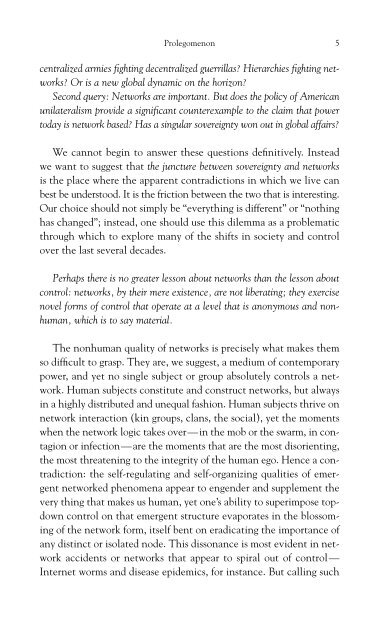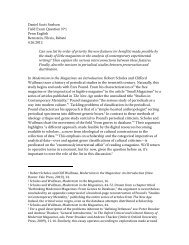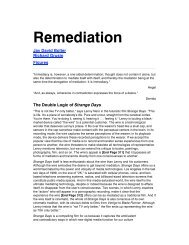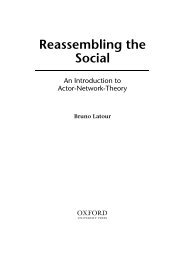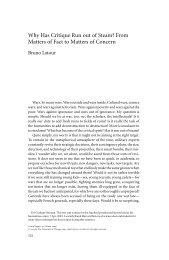The Exploit: A Theory of Networks - asounder
The Exploit: A Theory of Networks - asounder
The Exploit: A Theory of Networks - asounder
Create successful ePaper yourself
Turn your PDF publications into a flip-book with our unique Google optimized e-Paper software.
Prolegomenon 5<br />
centralized armies fighting decentralized guerrillas? Hierarchies fighting networks?<br />
Or is a new global dynamic on the horizon?<br />
Second query: <strong>Networks</strong> are important. But does the policy <strong>of</strong> American<br />
unilateralism provide a significant counterexample to the claim that power<br />
today is network based? Has a singular sovereignty won out in global affairs?<br />
We cannot begin to answer these questions definitively. Instead<br />
we want to suggest that the juncture between sovereignty and networks<br />
is the place where the apparent contradictions in which we live can<br />
best be understood. It is the friction between the two that is interesting.<br />
Our choice should not simply be “everything is different” or “nothing<br />
has changed”; instead, one should use this dilemma as a problematic<br />
through which to explore many <strong>of</strong> the shifts in society and control<br />
over the last several decades.<br />
Perhaps there is no greater lesson about networks than the lesson about<br />
control: networks, by their mere existence, are not liberating; they exercise<br />
novel forms <strong>of</strong> control that operate at a level that is anonymous and nonhuman,<br />
which is to say material.<br />
<strong>The</strong> nonhuman quality <strong>of</strong> networks is precisely what makes them<br />
so difficult to grasp. <strong>The</strong>y are, we suggest, a medium <strong>of</strong> contemporary<br />
power, and yet no single subject or group absolutely controls a network.<br />
Human subjects constitute and construct networks, but always<br />
in a highly distributed and unequal fashion. Human subjects thrive on<br />
network interaction (kin groups, clans, the social), yet the moments<br />
when the network logic takes over—in the mob or the swarm, in contagion<br />
or infection—are the moments that are the most disorienting,<br />
the most threatening to the integrity <strong>of</strong> the human ego. Hence a contradiction:<br />
the self - regulating and self - organizing qualities <strong>of</strong> emergent<br />
networked phenomena appear to engender and supplement the<br />
very thing that makes us human, yet one’s ability to superimpose top -<br />
down control on that emergent structure evaporates in the blossoming<br />
<strong>of</strong> the network form, itself bent on eradicating the importance <strong>of</strong><br />
any distinct or isolated node. This dissonance is most evident in network<br />
accidents or networks that appear to spiral out <strong>of</strong> control—<br />
Internet worms and disease epidemics, for instance. But calling such


